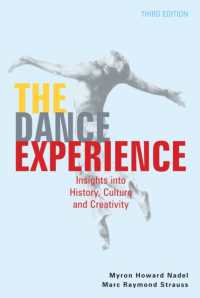- ホーム
- > 洋書
- > 英文書
- > Cinema / Film
Full Description
The battles fought in the name of the 'war on terror' have re-ignited questions about the changing nature of war, and the experience of war for those geographically distant from its real world consequences. What is missing from our highly mediated experience of war? What are the intentional and unintentional processes of erasure through which the distortion happens? What are their consequences?
Cinema is a key site at which questions about our highly mediated experience of war can be addressed or, more significantly, elided. Looking at a range of films that have provoked debate, from award-winning features like Zero Dark Thirty and American Sniper, to documentaries like Kill List and Dirty Wars, as well as at the work of visual artists like Harun Farocki and Omer Fast, this book examines the practices of erasure in the cinematic representation of recent military interventions. Drawing on representations of war-related death, dying and bodily damage, this provocative collection addresses 'what's missing' in existing scholarly responses to modern warfare; in film studies, as well as in politics and international relations.
Contents
IllustrationsContributorsAcknowledgments1. Introduction: Film and the epistemology of war, Christina Hellmich & Lisa Purse 2. Good Kill? U.S. soldiers and the killing of civilians in American film, Cora Sol Goldstein3. '5000 feet is the best': drone warfare, targets, and Paul Virilio's 'accident', Agnieszka Piotrowska 4. Post-heroic war / the body at risk, Robert Burgoyne 5. Disappearing bodies: visualising the Maywand District murders, Thomas Gregory 6. The unknowable soldier: the face of Freddie Quell, James Harvey-Davitt 7. Visible dead bodies and the technologies of erasure in the war on terror, Jessica Auchter 8. Ambiguity, ambivalence and absence in Zero Dark Thirty, Lisa Purse9. Invisible war: broadcast television documentary and Iraq, Janet Harris10. Nine cinematic devices for staging (in)visible war and the (vanishing) colonial present, Shohini Chaudhuri11. Afterword: Reflections on knowing war, Christina Hellmich








